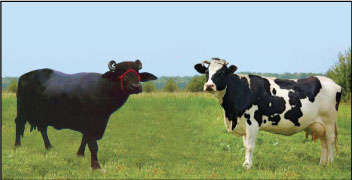
Animal HusbandryAgrowon
Effects of Plastic Waste on Animals
Plastic consumption reduces fodder, water intake and milk production for animals. To prevent such side effects, animals should have a healthy and balanced diet._x000D_
Result:_x000D_
• Plastic is easily swallowed due to its special qualities; however, it is non-digestible and harmful. It enters the stomach after consumption and stays there. _x000D_
• Plastic consumption in small quantity by an animal does not have major effect; though, excessive amount of plastic accumulation can have dangerous effects of their health, such as indigestion, slowdown of gastric movement, disruption in liver functioning, and others._x000D_
• Plasticity of plastic results in the formation of small stomach compartments where food is stored and food accumulation leads to indigestion. _x000D_
• A large quantity of stomach plastic leads to contraction and reduces digestion._x000D_
• The maximum amount of plastic in the stomach closes the rumor process because the gastric activity slows down. _x000D_
• Bacteria which helps the digestive system affect the abdomen’s pressure. This may affect the Ph level of the animal and hamper its mentality and appetite.
Signs of animal’s consumption of plastics:_x000D_
• Animals do not consume fodder and reduce water intake _x000D_
• Loss of milk production_x000D_
• Loss of gastric activity in less than three minutes_x000D_
• Dung decrease _x000D_
• Frequent stomach swelling _x000D_
• Blood tests do not show any blood effect _x000D_
• Physical temperature, heart rate and breath speed are irrelevant._x000D_
Treatment – Surgery is the only way of removing plastic from the stomach of an animal._x000D_
Preventive measures – Keep the area of cattle dwelling and surroundings plastic free. Control the use of plastic and dispose it appropriately._x000D_
Source - Agrowon, 27 December, 2018
383
0

